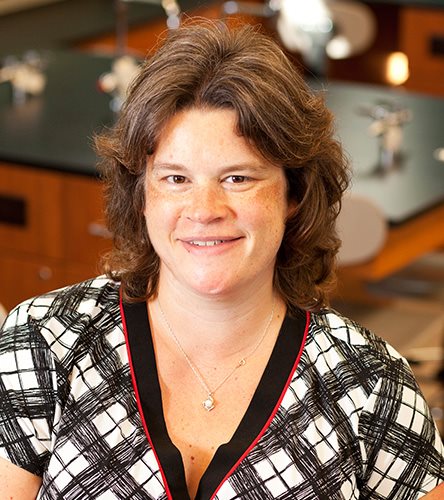BROOKLYN
245 Clinton Ave., Brooklyn, NY 11205
Main: 718.940.5300
Admissions: 718.940.5800
Fax: 718.940.5680
LONG ISLAND
155 W. Roe Blvd., Patchogue, NY 11772
Main: 631.687.5100
Admissions: 631.687.4500
Fax: 631.687.4539

Associate Chairperson and Associate Professor
Biology
BK LI
Ph.D., Molecular and Cellular Biology, Albany Medical College, 2002
M.S., Molecular and Cellular Biology, Albany Medical College, 1999
B.S., Biology, Molloy College, 1996
I have been a faculty member in the Biology department at St. Joseph's University, New York since 2007. The majors courses I most often teach are General Biology I and II (BIO 150/151), Endocrinology (BIO 450), and Cell Biology (BIO 460). I meet non-majors in Biological Control Systems (Bio 112) or Intro to Human Inheritance (Bio 115).
Prior to coming to St. Joseph's University I was a member of the Biological Chemistry department at Polytechnic University (now NYU Polytechnic School of Engineering) teaching freshman biology.
My research interests all fall into the category of cell and molecular biology. Currently we are exploring the use of phytochemicals to induce apoptosis in cancer cells. Our focus is mainly on breast cancer, but we have included glioblastoma and pancreatic cancer cells into this research.
Phytochemicals are naturally occurring plant compounds that are introduced to the human system via nutritional uptake. Active forms of the ingested phyrochemical are produced as digestive byproducts and taken up by individual cells where they have their effects. The phytochemicals we are concentrating on include indole-3 carbinol (I3C), its metabolic derivative diindolylmethane (DIM), as well as some soy derivatives. I3C and DIM have been shown to cause apoptosis in a variety of cancer cell lines.
At the core of my research interests is the mechanism by which apoptosis is induced. Therefore, we design experiments to determine which cellular proteins I3C and DIM interact with and at which level the apoptosis is initiated and completes. This includes receptors, signaling kinases, caspases, as well as microscopic analysis to evaluate the condition of cells throughout the process.
I also maintain an interest in the association of papillomavirus specific proteins and the transformation of normal cells to cancerous growth. Multiple members of the human papillomavirus family have been associated with the development of cervical cancer. Extensive work has been done on the bovine papillomavirus (BPV), where it has been shown in the literature that the expression of a specific BPV protein, BPV-E5, activates growth pathways at the receptor level. Previous studies have shown the physical interaction between BPV-E5 and the platelet-derived growth factor beta receptor (PDGFbR). We are currently interested in determining if there is a protective capacity of BPV-E5 to a cell that has been exposed to an apoptotic stimulus. There is some evidence in the literature that the protective capacity of BPV-E5 is temporary. We are interested in the mechanism by which BPV-E5 is affording this protection and perhaps determine why it is unable to continue the protection for longer periods of time.
The all encompassing term that best describes my research interests is "mechanism". If one can determine the mechanism by which a cellular process occurs in normal cells, then the potential for small molecular drug development for treatment of abnormal cellular conditions increases.
Klein DE*, Nappi VM*, Reeves GT, Shvartsman SY, Lemmon MA. 2004. Argos inhibits epidermal growth factor receptor signaling by ligand sequestration. Nature 430 (7003): 1040-1044.
* These authors contributed equally to this work.
Nappi VM, Schaefer JA, & Petti LM. 2002. Molecular Examination of the Transmembrane Requirements of the Platelet-Derived Growth Factor Receptor for a Productive Interaction with the Bovine Papillomavirus E5 Oncoprotein. J Biol Chem 277: 47149-47159.
Nappi VM, & Petti LM. 2002. Multiple Transmembrane Amino Acid Requirements Suggest a Highly Specific Interaction between the BPV-E5 Oncoprotein and the PDGFR. J Virol 76: 7976-7986.
Get Social
Get Social